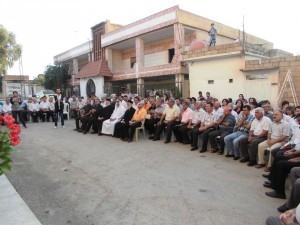Syrian Assyrians Want More Than an Apology

Opposition leader’s response seen as a first step to strengthen the Assyrian role in the Syrian opposition.
Akad Abdel Ahad
(Al-Hasaka, Syria) Members of the minority Assyrian community in Syria have welcomed an apology by the leader of the National Coalition for Syrian Revolutionary and Opposition Forces after he failed to mention the community in a recent speech at a meeting of the Arab League in the Egyptian capital, Cairo in September.

Hadi al-Bahra became president of the Western-backed Syrian opposition in July this year.
But advocates of the Christian group have urged him to do more to protect the interests of minorities like the Assyrians and include them in the opposition movement.
Assyrians are the second largest minority group in Syria.
Speaking in Cairo, al-Bahra explained that the Syrian rebel forces are fighting on two fronts: against the regime of President Bashar al-Assad and the Islamic State in Syria and Iraq (ISIS).
Shlemon Benjamin is from the village of Khabour in northeastern Syria. He said Bahra’s apology in October was “a step in the right direction” but “not enough” to meet the needs of Assyrians.
“We call for the strengthening of the Assyrian role in the coalition and for giving more guarantees to Assyrians who are being subjected to a campaign of terror targeting their historical existence in this land,” he said.
Benjamin is worried that Bahra’s omission is symptomatic of a more systematic effort to eliminate the Assyrian presence in Syria.
“Al-Bahra’s marginalization of Assyrians is a reflection of the Assyrian condition in Syria for the last half a century,” he said. “When the current of Arab nationalism took over Syria, it eliminated everything that was not Arab, particularly anything Assyrian.”
There are currently around 500,000 Assyrians in Syria, mostly confined to the main cities of Damascus, Aleppo, and Homs. The largest Assyrian population is in Hasakah governorate in the far northeast of the country.
The ongoing civil war in Syria has led many Assyrians to emigrate to Europe, the United States, and Australia, or to flee to neighbouring countries.
Members of the Assyrian community are often targeted by extremist Islamist groups and other armed militias. Many Assyrian churches and monasteries in towns such as Deir al-Zor, in Syria’s northeast, have been destroyed.
The city of Sadad, which lies between Damascus and Homs, recently marked the first anniversary of the massacre of hundreds of people and the destruction and burning of churches and houses by the Islamist faction Jabhat al-Nusra.
The city of Qamishli in Hasakah governorate is currently under siege from ISIS. ISIS has sought to take control of the religiously and ethnically diverse city and impose its hard-line ideology.
Jameel Diyarbakerly, an Assyrian politician, gave a similar response to al-Bahra’s apology.
“The coalition has marginalised Assyrians on numerous occasions,” he said
“Al-Bahra’s apology to Assyrians is a necessary first step, but it must be followed by more to strengthen the role of Assyrians in the Syrian opposition,” he said. “It has a duty to do so after so many years of exclusion and marginalisation.”
“The fact that no Assyrians were appointed as ministers in the temporary government, despite its adoption of quotas, and now al-Bahra’s statement in front of Arab ministers in Cairo, has led many Assyrians to denounce this exclusion which occurred also under the Baath regime,” he added.
A resident of the city of Dirik, located on the Syrian border between Turkey and Iraq, spoke by phone and preferred to remain anonymous.
“The National Syrian Coalition did not give enough to win over the Assyrians. The apology alone is not sufficient, but it is a good step that Syrians haven’t seen before,” he said.
Fareed Komo, a member of the Syriac and Assyrian Youth Coordinators Union, said the growth of armed Islamist groups in Syria posed a danger to the Assyrian community.
“I hope that the international community imposes a political and diplomatic solution between all sides on the basis of the Geneva agreement[s],” he said. “Bashar al-Assad’s regime is leaving all minorities to face their fate alone. This threatens a frightening future for the unarmed in the region.”
